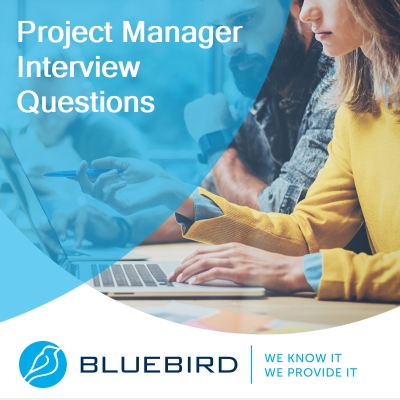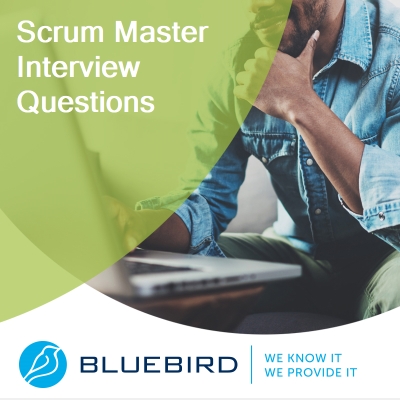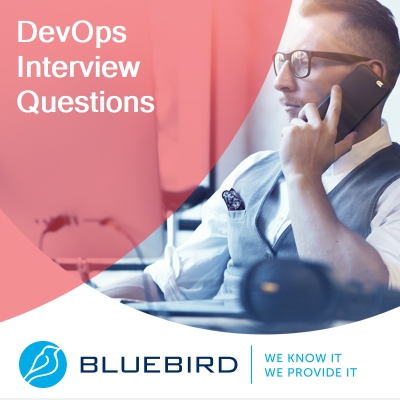Common interview questions and answers: What are the most common questions and answers at an interview? Get to know more!
More...
Value-Driven Selection
As Bluebird's CEO, it's me who conducts candidates' last round of interviews. Why? Because my goal is to hire professionals whose values I am confident in.
For candidates who are forwarded to me for an interview, competence is no longer an issue. There is only one focus: personal values. Of course, this is not the case for every company and interview, but I think businesses worldwide are increasingly looking for people with great soft skills. And that essentially means looking for "good people", valuable people, people we would like to talk to even outside of working hours. For me, values are the main focus, but I don't think it should be the number one consideration for every single job. In any case, this aspect – the human aspect – shows up again and again in the questions below.
Besides general questions, I'll also show you samples of IT role-specific questions for Web Developer, DevOps engineer, Scrum Master and Project Manager roles, among others.
I would like to emphasize, however, that rejection after an interview does not mean that the candidate lacks the values mentioned above. It simply means that someone else has been selected for that specific job.
Let's look at the interview questions and answers! I'll explain what each one is about.

11 Common Interview Questions and Answers
We will show you common job interview questions that tell the hiring manager or hiring team more about you, than you think. These questions are part of the hiring process and believe me, with good reason. You will be asked about your current role, whether you are a good team player or not, what your weaknesses are, and so on. There are all common interview questions you could face in your next interview. Let's check them one-by-one.
1. "What do I need to know about you?"
How you answer this question is extremely telling. Is the tone of what you say positive or negative? Is it personal or professional? Can you highlight anything at all, or do reply "what should I tell you about"?
Before the interview, it's worth thinking about what you would say about yourself. Something that really reflects you and your personality.
Anyone who has ever worked in sales knows the power of the sales pitch. You have 2 minutes, tell us what you think is important! If you know what you are going to say, you are a winner. If it lets your personality show through, even more so!
Prepare in advance! In my opinion, it's a good idea to include an introduction (who you are, how you got there, etc.), information about your professional background, experience, and some personal information.
2. "What are your areas for improvement?"
This is the most popular question you're likely to encounter in a job interview. Surprise: The hiring manager knows you're not going to make a revealing statement about the major mistakes of your past. Instead, they want to know how well you know yourself and whether you're doing anything to improve your weaknesses.
This is the interview question that many people fear most. You shouldn't, though: it is a great opportunity to highlight your own strengths. Don't list your personal flaws, but focus on your professional characteristics and soft skills. For example: 'I am working hard to improve my communication skills to become a more successful speaker. I recently did a communication training and it turned out that I'm considered a funny speaker."
Another version of this question is when you are asked to describe a situation in which you failed. Again, here they are asking if you are willing to admit that you had made a mistake in the past and, if so, whether you learned from it. The answer will show how you reacted to the situation, whether you have drawn the right conclusions from it, and whether you have improved since then.

3. "What are Your Plans for the Next Three to Five Years?"
What is this question about? The interviewer wants to know whether you are ambitious and how much you know yourself. It may turn out that you have unrealistic expectations or you have high ambitions for a job where there is no room for progression (e.g. office manager).
Unfortunately, interviewers often get very clichéd answers to this question.
Sample answer: "I would like to work as a manager in 3-5 years." This answer often points to a degree of self-awareness. After all, if the interview reveals that you are not a leader type and that the managers in the field have more than 3-5 years of experience, you do not yet have a grasp of the complexity of the task. This is not a problem, of course, but it tells the interviewer a lot about you.
I suggest you be careful when answering this question.
4. "Why Would You Be the Best Choice?"
This is one of the most deceptive questions in job interviews. Nobody likes it, of course. But it's not really about proving your qualifications. In fact, you shouldn't tell them that (in general) you are the best person for this dream job. Tell them specifically what technical skills. soft skills, and knowledge you have that make you a very suitable candidate. Humility about the role is not a sin, on the contrary.
If you say "come on, I can do this task easily", then it is a strong signal to the interviewer that you do not have a good grasp of the tasks and their depth.
Do some preparation about the tasks listed in the job description! Consider what qualities you believe the company would appreciate in you.

Have you solved similar problems, done similar tasks before?

Do you have relevant industry experience?

Have you taken a course or participated in training that specifically fits the job description?
List everything, don't leave out information!
5. "Why Do You Want to Work With Us?"
Just as you spent some time preparing for questions about the job, you should spend time getting to know the dream company!
Just by spending a few minutes searching online, you can find out a lot about the company. Usually, the questions asked in a job interview are designed to find out if the candidate fits the job and if the job is suitable for the candidate. The purpose of this question is to find out whether you are serious about the job and whether you really want to work for the company.
Be honest about your opinion of the company and what you like about it. It's always very interesting to me when a candidate actually knows about Bluebird's blogposts and services. When that happens, I know that they have put time and effort into their preparation.
What about the opposite, when you know nothing or next to nothing about the dream company? The contrast is huge. And remember, in an ideal situation, the interviewer has also spent time getting to know you (maybe even checked out your social media channels). It would be frustrating if the interviewer knew a lot about you, but you didn't know at all what the company you were interviewing for did.
6. "What was the reason behind your decision to leave your previous job?"
You should aim to tell the truth here, too.
If you give an answer that suggests that it was you who decided to leave, you can be sure that a few minutes later there will be another question about the circumstances of your leaving, just phrased differently.
Tell it like it was! In a way that is not indiscreet, not offensive to others but factual, fair, and true. Don't make it personal, even if you left your previous job because of your former manager. Tell it simply and factually.

7. "Mention One Time You Were Really Satisfied With the Work Done"
The purpose of this question is to give the hiring manager or the hiring team a little insight into your motivation. When you answer, highlight a task or project that made you truly enthusiastic.
At the moment, I would give this example: 'My last big task was the creation and development of Bluebird's online presence. It took a great amount of effort to reach the number of visitors we have now through the contents we share on the website. We had to think carefully about who we were writing for, how we could help them, and why they should read our articles. It took empathy, patience, and diligence to achieve top results in Google search for job interview questions, for example. I am proud that we had the determination and resolve to do it. We started and we didn't stop until we achieved our goals."
8. "Would you please list three positive qualities that your previous boss would mention about you?"
Again, the question provides an excellent opportunity to demonstrate your abilities. Take advantage of the opportunity to flatter yourself through the words of others. "My former boss regards me as the most thorough programmer he knows. He is confident I complete all tasks on time, and he likes my sense of humor. He and I both had a good time working together."
9. "Do You Have a Specific Salary in Mind?"
If the potential employer tells you the salary ranges they set for the position, you will have an advantage. However, even if they don't, you can find approximate answers by conducting a quick internet search. Bluebird also publishes salary information for specific IT job areas based on experience and job title. It also doesn't hurt to ask around among your friends to see who makes what in comparable positions at other companies.
It is important to note that salary is only one component of the perks package. Companies also try to attract talent by providing cafeteria allowances, laptops, mobile phones, and company cars for positions above a certain level. Home office, training, travel, and conference participation are all included in the package.
Ideally, however, the interviewer or the hiring team is aware that candidates are typically most interested in the gross salary, as this is what they consider to be a certainty. Everything else is merely decoration.
10. "Why Did The Advertised Position Catch Your Attention?"
Answer specifically, but be careful not to overdo it! Explain the points in the job description that you have knowledge, experience, and skills to do well. But you can also expand on those where you don't. A sensible interviewer will notice the ones you haven't mentioned and will be guaranteed to ask you about it.
If you're at the interview because you're truly interested in the job, you'll have an easy time with it. Simply tell them what you like about the new job. Even ask about how exactly certain tasks are to be understood. For example, "Does project management include planning project schedules? Who will I have to consult if the project schedule changes or needs to be modified?" As you might have noticed, we are already talking about who you will consult when you are working at the company. We are imagining the situation and already talking about a possible future.
11. "What Was the Biggest Challenge of Your Life and How Did You Solve It?"
Your biggest challenge says a lot about you. Whether your challenge was people-related, task-related, process-related, deadline-related or other.
Another interesting part of the answer might be the level of challenge you are starting to talk about? Small thing, huge? Could it have been accomplished? Perhaps you didn't realize you were trying to do an impossible thing? It says a lot about you what example you bring up.

List of Questions For IT Recruiters & Tech Talents
1. Scrum Master Interview Questions
We have collected the most important interview questions. They touch upon daily standup meetings, sprint planning, demos, the retrospective, the backlog, and scrum master roles like helping, supporting, or protecting the team. Check out the interview questions we collected for interviewing a scrum master.
2. Project Manager Interview Questions
Our interview questions about the project management role focus on project scope, planning (budget, resources, timeline), and team- and customer handling. By reading the questions, you'll get a clear understanding of project management tasks, processes, and priorities.
The project management questions we listed cover all important aspects of the role.
3. Business Analyst Interview Questions
A deep understanding of requirements is essential to be a good business analyst. But to become an expert in designing software, you should be familiar with customer interviews, analyzing business processes, maintaining good client relationships as well as handling change requests. We've gathered our interview questions about the business analyst role with care.
4. Software Developer Interview Questions
a. Questions About Web Development
No, these web development questions are not about technology, but about the 3-tier software development role. And developers in this role must have good knowledge of requirement gathering, planning and designing, UX, SEO, testing, security, and much much more. Check out our questions for the web developer role!
b. Interview Questions regarding Programming Languages or Frameworks
b1. Spring Boot Interview Questions
b2. Python Interview Questions
b3. Angular Interview Questions
b4. Spring Interview Questions
b5. Hibernate Interview Questions
5. DevOps Interview Questions
DevOps is a relatively new IT role. If you want to be familiar with it or you'll simply have a DevOps job interview as an IT Recruiter, our blog post with DevOps interview questions is a must-read for you.
6. Manual Tester Interview Questions
A manual tester is a professional of precision and thoroughness. To do this job well, a manual tester has to be good at test planning, test case design, and test execution besides bug reporting, regression testing, etc. We have a full set of questions about manual testing you can use for your interview preparation.
Weird job interview questions
Unexpected questions can also arise during the interview. Let's look at what the purpose of weird interview questions is and how to answer them.
"Estimate how many tennis balls you can fit in an airplane" or "What April Fool's joke would you play on your supervisor" or "What kind of animal would you choose to be" are just three of the quirky job interview questions you might encounter in a job interview. It's not just giant tech companies like Google or Facebook that ask weird questions like this.
More and more companies are taking advantage of this method, as they want to get to know you outside your comfort zone and see how you react in strange situations.

Each of the questions above looks at a different characteristic. In the tennis ball question, you can show how well you can think logically. The April Fool's joke asks about your ability to react to a totally unexpected situation. And the animal question is about your character, even if you don't immediately see how. But think about it: what does dog, horse, rooster, or dragon symbolize?
What Is the Purpose of Weird or Tricky Questions?
Weird interview questions are designed to gauge how you respond to an unexpected situation or task, and how inventive you are. There is no right or wrong answer to most odd questions. These quirkier job interview questions give you the opportunity to prove that you can think on your feet, are creative and blessed with a healthy dose of a sense of humor.
By setting up interesting situations, the interviewer will try to get to know you outside your comfort zone and see how you react to an unrehearsed situation. In these situations, you're likely to let your guard down, give the interviewer insight into your personality, your way of thinking, and you can also show off your communication skills and personality traits. The point is, you shouldn't be intimidated by these questions.
The most common weird interview questions can be grouped into four main categories.
1
Hypothetical situations
2
Opinions and preferences
3
Morality tests
4
Travel
Let's take a closer look at each of the four categories of unusual job interview questions, with some hints for possible answers.
1. Hypothetical Situations
This is the most popular category, with a lot of strange questions. The interviewer asks you to imagine a certain situation or put yourself in a certain situation.
Role Play I.
In many cases, the task is to choose a historical figure or historical situation.

Which king (or Prime Minister) would you have lunch with and why?

Who would you like to have dinner with, living or dead?

If you could spend a day with anyone in the world, who would it be, and what would you talk about? Why would you choose that person?
Questions like these are designed to explore your creative thinking, to give the interviewer a little insight into your general literacy and historical knowledge. But they are also designed to show how unique, unusual, and different your behavior is and how you handle an unusual situation.
Some hypothetical questions are more complex, designed to assess your problem-solving skills. The answer is not as important as the logic that leads to the solution. For example: "Imagine you get lost in a country where no one speaks your language, and there is no internet. How do you get home?"
The tennis ball question mentioned at the beginning of this post also falls into this category. The interviewer wants to know if you can keep your wits about you, if you can improvise a plan on the spot.
Role Play II.
Hypothetical job interview questions include those where you are asked to imagine yourself as a different person or an object:

If you could be any famous person in the world, who would you be and why?

What part of a bicycle would you be and why?

Which animal describes your professional personality best?

If your current company is a boat, where are you on it? (general question for managers)
Obviously, there is no right or wrong answer to these questions. The interviewer wants to see how you answer and what explanation you give for your choice. Similar job interview questions are often designed to lighten the mood, to let you show your personality. That's why it's important to back up your answer with a reasoned explanation.

2. Opinions and Preferences
These questions are designed to help you articulate your opinions, to show your personality by choosing between two options. The answers will also give the interviewer an indication whether you're a good culture fit for the organization.

If you could be any famous person in the world, who would you be and why?

What do you think about garden gnomes?

Where do you like to eat lunch?

What is your favorite ice cream flavor?
Again, there is no right or wrong answer to these strange questions. The employer is interested in the explanation, assessing whether you're prone to drawing a blank or whether you're easing up and present an interesting, exciting story to back up what you're saying.
3. Morality Tests
There are taboo topics that an interviewer should not ask about during the interview because it would simply be illegal. These include religious beliefs, personal agendas, and political affiliations, for instance. However, your personal values are a good indicator of whether or not the job is right for you from a cultural point of view. The employer might also want to see how you respond to even slightly controversial questions:

What is one crime you would commit knowing you would never be punished for it? If you did, how would you feel about it?

What is the biggest wrongdoing you have ever committed?
They will try to infer your personal characteristics from your answers. They are not looking for a specific answer, they are looking for supported and logical answers. They also look at your reaction to the question and, in some cases, how honest you can be.
4. Travel-Related Job Interview Questions
In the last category of quirky interview questions, they may ask about your travel habits, where you've been and where you'd like to go.
For example:

What is the wildest place you have visited?

What does a once-in-a-lifetime holiday look like for you?
The employer is trying to assess your cultural background and orientation by asking you these questions. Here too, the quality, elaboration, and presentation of the answer are all important.
How to Give Good Answers
A job interview is a stressful situation in itself, even without weird questions. The interviewer can estimate your professional skills from your CV and your answers. A little piece of your personality can be revealed through the use of quirky job interview questions.
As strange and unexpected as these questions might be, you can prepare for them. The key is to plan for every situation, thinking ahead about what you might have to say. And don't panic!
Be Prepared!
The best way to prepare is to practice. Start with general job interview questions first, and ask a friend or acquaintance to help you practice. Think of some odd questions!
Stay Calm!
You may not know the answer right away. It's OK. Just think about it. You won't know everything all at once at work, either. The question is whether you'll break down, start to ramble on, or you'll think through your answer calmly, perhaps even admit that you need time to think. Believe me, it says a lot about you and how you handle these situations in the interview.
Take Your Time!
If you suddenly can't think of anything, take a pause rather than answering questions incoherently. For example, you can buy a few seconds by saying something more general: "That's a very interesting question, let me think about it for a moment."
Ask Back!
Most weird job interview questions are designed to gauge your responsiveness and your critical thinking. As I mentioned, most of the time there is no right answer. Present your arguments clearly and concisely to show your line of thought clearly. If you really don't understand what they want to know, feel free to ask back, and ask them to clarify the question.



